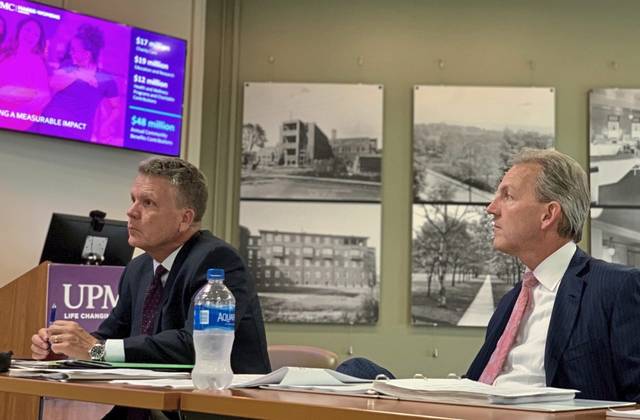UPMC’s longtime financial chief announced Thursday that he plans to step down at the end of the year.
Robert DeMichiei has served as chief financial officer of the multibillion-dollar, nonprofit health system headquartered in Downtown Pittsburgh’s U.S. Steel Tower for nearly 16 years. The 54-year-old Hampton resident said his retirement from the top UPMC post shouldn’t come as a surprise to colleagues or those close to him.
“It’s been a good run, but it’s time,” DeMichiei told the Tribune-Review by phone Thursday night.
DeMichiei said the corporate management team he’s leaving behind in December is packed with “top talent” ready to tackle the uncertainties and obstacles confronting the health care industry.
“The industry is challenging because it’s transforming right in front of us,” DeMichiei said. “There’s a need to do better and be disruptive. The best thing about UPMC is that it’s very well-positioned for that transformative change.”
UPMC, which controls both health provider and insurance arms, employs more than 85,000 people. It can boast of having more than 4,000 physicians, 40 hospitals and 600 doctors’ and outpatient offices.
Its insurance membership has grown to 3.5 million people.
“The thing I’m most proud of is the team we have developed together,” DeMichiei said. “We have incredible physicians … and our team obsesses over the patient experience.”
During his tenure, DeMichiei has seen UPMC — Pennsylvania’s largest employer outside of government — grow by billions of dollars in revenue while advancing plans for ambitious investments and expansions in Western Pennsylvania and across the state.
Revenue for UPMC totaled $18.77 billion last year and net assets topped $6 billion, financial statements filed with state regulators show.
It took in $3.1 billion more in operating revenue last year than it did in 2017 — a year-over-year increase of a whopping 20%.
“We’ve had exceptionally strong balance sheets in the last several years … and we see a lot of bright notes,” DeMichiei said.
He cited recent patient volume increases and he expects UPMC to continue to improve financially in coming years.
UPMC also has faced intense scrutiny and criticism in recent years.
Among them were allegations of suppressing employees from unionizing; protests by residents opposed to new hospitals under construction; and a high-profile legal challenge by Pennsylvania Attorney General Josh Shapiro.
Shapiro dropped his quest to challenge UPMC’s nonprofit status when UPMC unexpectedly struck a 10-year contract with Pittsburgh-based rival nonprofit health system Highmark in late June.
DeMichiei said he hopes that with such a “distraction” over, the region is poised to benefit from healthy competition that he says will continue to lower costs and improve the quality of health care options.
He said that UPMC operates like a for-profit corporation only in terms of wanting to be efficient and run effectively.
“We want to be efficient, we want to reduce waste, we want to negotiate with our vendors for the best contracts,” DeMichiei said. “The difference is in a for-profit, the benefits are accrued by the shareholders. With us, we can channel that efficiency and the profits back into the mission of the organization and into the community.”
UPMC’s efforts to better serve patients span “everything from the parking attendant to the physician’s office,” DeMichiei said.
The health system has been increasing the number of available telemedicine and video appointments, for example, and offering more convenient services at outpatient clinics in suburban communities outside the city of Pittsburgh to compete with urgent-care clinics.
UPMC is on track to spend more than $1 billion this year on capital projects and related investments this year.
UPMC CEO Jeffrey Romoff issued a statement crediting DeMichiei with having “played a key role in UPMC’s growth to a $20 billion integrated health care financial and delivery system.”
“He led UPMC’s implementation of many industry-leading financial management best practices, including our adoption and compliance with Section 404 of the Sarbanes-Oxley Act,” Romoff said.
The federal law ushered in sweeping changes aimed to increase the transparency and and internal controls of financial reporting among public companies.
DeMichiei said he’s eager to take a break from more than three decades of 60-plus-hour work weeks. He plans to spend more time writing and teaching classes at the University of Pittsburgh. He is considering working as a corporate board adviser. He continues to serve on several boards, including the United Way of Southwestern Pennsylvania and Seton Hill University.
Ed Karlovich, CFO of UPMC’s Health Services Division, will replace DeMichiei in an interim capacity while the board searches for a permanent successor. Karlovich has been with UPMC since 1990.
Romoff said that a nationwide search for candidates will begin immediately.








